This article was co-authored by Adam Dorsay, PsyD and by wikiHow staff writer, Megaera Lorenz, PhD. Dr. Adam Dorsay is a licensed psychologist in private practice in San Jose, CA, and the co-creator of Project Reciprocity, an international program at Facebook's Headquarters, and a consultant with Digital Ocean’s Safety Team. He specializes in assisting high-achieving adults with relationship issues, stress reduction, anxiety, and attaining more happiness in their lives. In 2016 he gave a well-watched TEDx talk about men and emotions. Dr. Dorsay has a M.A. in Counseling from Santa Clara University and received his doctorate in Clinical Psychology in 2008.
There are 34 references cited in this article, which can be found at the bottom of the page.
wikiHow marks an article as reader-approved once it receives enough positive feedback. In this case, 88% of readers who voted found the article helpful, earning it our reader-approved status.
This article has been viewed 23,164 times.
Aging is an inevitable process. Fortunately, there are things you can do to give yourself the best possible shot at staying healthy and happy as you get older. You can start by forming healthy life-long habits, preferably at a young age. Stay emotionally fulfilled and keep your mind sharp by doing things you love and investing in strong friendships. You can also keep yourself looking your best by caring for your skin, hair, nails, and teeth.
Steps
Caring for Your Health
-
1Start caring for yourself as early as possible. If you can, develop healthy lifestyle habits while you’re still in your 20s. The choices you make while you’re young can have a major impact on how you age.[1] For example, people who eat a healthy diet and exercise regularly in their 20s are much less likely to develop heart disease as they enter middle age.[2]
- If you’re already out of your 20s, you can still reap major benefits (such as reduced risk of heart disease and diabetes) by adopting a healthier lifestyle at any age.[3]
-
2Eat a healthy diet. What you eat affects your health as you age, so stick to healthy foods that are rich in a variety of nutrients. While different people have different dietary needs, it’s generally best to eat a diet that includes a rainbow of fruits and vegetables, lean proteins (such as fish, poultry, and legumes), healthy fats (such as nuts, seeds, and olive oil), and complex carbohydrates (like those found in brown rice and other whole grains).
- Some studies have suggested that the Mediterranean diet, which is rich in healthy fats and antioxidants, may help slow the aging process.[4]
- Avoid refined, processed, and pre-packaged foods. Don’t eat a lot of foods that are greasy, sugary, or high in sodium.[5]
- Talk to your doctor or a registered dietitian about how to best meet your personal dietary needs.
Advertisement -
3Get plenty of exercise. If you can, try to do at least 30 minutes of moderate aerobic activity every day and a little strength training 2 to 3 days a week. Some good examples of aerobic exercise include jogging or walking, biking, and swimming. Strength training could involve lifting weights or using resistance machines at the gym.[6]
- The type and amount of exercise you should be doing depends on a lot of factors, such as your current age, level of fitness, and overall health. Talk to your doctor about what kind of exercise is appropriate for you.
- Maintaining a healthy exercise routine into middle age and beyond may slow the aging process in your body at the cellular level.[7]
- Exercise can
-
4Maintain a healthy weight. Talk to your doctor about the healthiest and most effective ways to manage your weight. For most people, this involves a combination of good dietary choices and exercise.
- Being either overweight or underweight can be associated with health problems as you age.[8] Work with your doctor or a dietitian to figure out the healthiest weight range for you at your current age and as you get older.
-
5Practice good sleep hygiene. Keep yourself healthier and happier as you age by ensuring that you get plenty of good-quality sleep. To get the sleep you need, establish a consistent bedtime and wake-up time. Turn off all bright screens at least 30 minutes before bed and try unwinding by taking a warm shower or bath and reading from a relaxing book. Make sure your room is dark and comfortable at night.
- Most adults need 7 to 9 hours of sleep per night to stay healthy.
- As you get older, you may have a more difficult time sleeping comfortably at night. Ask your doctor for advice if you have trouble getting a good night’s sleep.[9]
- Lack of sleep can contribute to a variety of health problems, including premature aging of your skin.[10]
-
6Protect your skin from the sun. Whenever you spend time in the sun, wear a broad-spectrum sunscreen with an SPF of at least 30. You can protect yourself further by wearing sunglasses, a hat, and clothing that covers your arms and legs. Too much sun exposure can prematurely age your skin and put you at risk of developing skin cancer.[11]
- Instead of tanning yourself in the sun or at a salon, skip the harmful UV radiation and use a sunless self-tanning spray or lotion.
-
7Avoid tobacco products. If you use cigarettes or other tobacco products, talk to your doctor about the best way to quit. Smoking can contribute to a whole host of health problems as you age, including lung cancer, emphysema, heart disease, and stroke.[12] It can also dramatically speed up the aging of your skin.[13]
- Quitting tobacco can dramatically reduce your risk of developing smoking-related diseases. For example, after you quit smoking, your risk of having a stroke may drop to around that of a non-smoker within just 2 to 5 years.[14]
-
8Limit your alcohol intake to no more than 1-2 drinks per day. Doctors recommend that women have no more than 1 alcoholic drink per day at any age, while men under 65 should limit themselves to 2 drinks daily. Men over 65 should restrict themselves to just 1 drink.[15] Your ability to tolerate alcohol diminishes with age, so you may need to cut back even more as you get older.[16]
- 1 alcoholic drink is defined as 12 fluid ounces (350 mL) of beer, 5 fluid ounces (150 mL) of wine, and 1.5 fluid ounces (44 mL) of 80 proof distilled spirits.[17]
- There is some evidence that moderate alcohol use can reduce your risk of certain age-related diseases, such as heart disease, stroke, and diabetes. However, excessive drinking can contribute to a wide variety of health problems, such as cancer, pancreatitis, heart problems, and liver disease.[18]
- If you are dependent on alcohol or worried that your alcohol use might be affecting your health, talk to your doctor about the best way to cut back or quit.
-
9Take good care of your teeth. Brush your teeth at least twice a day with a fluoride toothpaste and floss your teeth daily. You can also protect your teeth by avoiding sugary and acidic foods. See your dentist as often as recommended (usually twice a year) for cleanings and dental health checkups.[19]
- Your risk of dental disease and tooth loss increases as you get older.[20]
- Diseases of the gums and teeth are correlated with other health problems, such as stroke, diabetes, heart disease, and rheumatoid arthritis. Investing in good dental care can also benefit your overall health and quality of life as you age.[21]
-
10Get regular medical checkups. Seeing your doctor regularly is vital for prevention and early detection of age-related health problems. Make appointments as often as recommended for physical exams and any other necessary tests and evaluations.
- How often you should see your doctor and what kinds of routine checkups you need depend on factors such as your age, sex, and overall health. Talk to your doctor about your routine care needs.[22]
Meeting Your Mental and Emotional Needs
-
1Take up some creative hobbies. Try to make time for creative activities you enjoy, such as painting, dancing, doing crafts, or making music. If you’ve never had a creative hobby, look into taking classes or joining a local group that fits with your interests. Studies show that participating in creative and artistic activities can greatly benefit the mental and physical well-being of older adults.[23]
- Artistic hobbies such as drawing, painting, pottery making, quilting, and woodworking are associated with a significantly reduced risk of developing cognitive issues and memory problems as you age.[24]
- Joining classes or groups that share your creative interests can also help you make social connections, which are vital to good mental and physical health as you grow older.[25] [26]
-
2Try yoga and meditation. In addition to keeping your joints limber and building strength in your bones and muscles, yoga can also reduce stress and hypertension and keep your mind sharp.[27] You can get even greater mental and emotional benefits if you combine your yoga practice with meditation, which can slow age-related mental decline.[28] [29]
- If you’re new to yoga and meditation, do a search for classes in your area. You can often find affordable classes at gyms and community centers.
- If you’re already middle-aged or older, look for yoga classes that are specifically geared toward older adults or seniors. Talk to your doctor, a personal trainer, or a physical therapist about what poses are safe and appropriate for you.
-
3Do puzzles and games that exercise your mind. Games and puzzles that engage your brain and memory can help keep your mind sharp and improve your cognitive skills.[30] As you master one type of game or puzzle, look for new ones to keep challenging your brain and working different mental muscles. A few types of games and puzzles you could try include:
- Tangrams and shape-finding games.
- Memory games, like Simon or card-matching games.
- Sudoku and crossword puzzles.
- Word-building games, like UpWords, Scrabble, or anagram games.
- Trivia games.
- Strategy-based board games, like chess or Parcheesi.
- Despite their bad rap as time-wasters, even video games can have cognitive and emotional benefits for older adults![31]
-
4Take measures to minimize stress in your life. While some stress is inevitable, there are things you can do to combat it. In addition to doing things that you find enjoyable, you can also reduce your stress levels by keeping your time and environment organized. Look for ways to get unnecessary obligations off your plate and find time to relax.
- Stress can contribute to a variety of health problems, including accelerated aging on the cellular level.[32]
- If you’re stressed because you're having trouble keeping track of all your tasks and responsibilities, try keeping a paper planner or setting reminders for yourself on your phone or computer.
- If you can, ask friends or family to help with things that are stressing you out. This can take some of the pressure off you and give you an opportunity to spend quality time with people you love.
- Try to set aside a little personal time each day to do something fun, work on a project that’s important to you, or just unwind.
-
5Stay connected with your friends. As you get older, look for ways to keep spending quality time with people you are close to. People who engage in social activities with good friends tend to live longer, stay mentally and emotionally healthier, and enjoy a higher overall quality of life as they age.[33]
- If you don’t have any close friends to hang out with, look for ways to meet new people and form new friendships. You might do this by taking classes, joining clubs or groups in your area, or participating in causes you care about.
- Look for opportunities to mingle, like dances and other social events near you.
-
6Maintain an upbeat attitude about aging. Instead of looking at aging as a loss or decline, look at the positive aspects of growing older. Reflect on the wisdom and experience that you’ve gained and think about how you can use those things to be a positive force in the world and in the lives of those around you. And remember, getting older doesn’t mean that you have to stop having fun![34]
- Studies show that people who stay positive and upbeat about aging tend to stay more physically, cognitively, and emotionally healthy than those who have more negative attitudes.
- Finding a strong sense of purpose is a great way to stay positive as you age. Focus on something in your life that is deeply meaningful to you, such as family, causes you care about, or any spiritual beliefs you may hold.
Looking Your Best as You Age
-
1Moisturize your skin daily. As you become older, your skin tends to dry out, contributing to the appearance of fine lines and wrinkles. You can help your skin stay moist and retain its elasticity by applying gentle moisturizers to your face, hands, and body every day. Choose products that are free of fragrances and oils to prevent irritation and clogged pores.[35]
- For the greatest benefits, apply moisturizer while your skin is still damp after showering or washing your hands or face.
- Give special attention to areas that tend to dry out the most, like your hands and elbows.
-
2Try a retinoid cream to reduce wrinkles. Ask your doctor or dermatologist about using a retinoid product, such as tretinoin, to treat your skin and slow down the aging process. These products typically come in cream, gel, or liquid forms, and may be applied to the skin once daily after cleansing.[36]
- In addition to treating and preventing sun damage, retinoids can also unclog your pores and improve uneven pigmentation.
- Although they offer many benefits for your skin, retinoids can also cause side effects such as irritation and redness, drying of the skin, and itching. Talk to your doctor about the risks and benefits of using retinoids.
-
3Take care of your hair and nails. Your hair and nails tend to get more dull, dry and brittle as you age.[37] Keeping them healthy can make you look younger.
- Keep your nails young by moisturizing them regularly and keeping them trimmed and clean. You can apply a nail hardener for added strength, but be cautious about using drying polishes and gels.[38]
- Condition your hair every time you wash it and use gentle, sulfate-free shampoos and conditioners. Avoid harsh heat styling tools and chemical dyes and relaxers.
- Talk to your doctor about using biotin supplements to boost the health of your hair and nails.
-
4Avoid foods and drinks that stain your teeth. Minimize staining beverages like wine, coffee, and tea. Tobacco products can also stain and discolor your teeth. Maintaining white, healthy-looking teeth can keep you looking younger for longer.[39]
- Your teeth may naturally begin to darken as you age because your enamel tends to wear down and the yellower dentin underneath begins to thicken.
- If your teeth are discolored, talk to your dentist about safe and effective options for whitening your teeth and removing stains. Some options include adding porcelain veneers or having an in-office whitening procedure done.
-
5Choose clothes that flatter you. As you age, look for clothes that appeal to your sense of personal style but also help you look your best. The way you dress can have an impact on how old you look—and feel. While there are no hard and fast rules for what you can or can’t wear at any age, you can keep yourself looking sharp and youthful by:[40]
- Offsetting black or dark clothes with contrasting bright or neutral accessories. Black is slimming, but brighter tones help your skin look less washed out and draw attention away from shadows and wrinkles.
- Wearing fitted or tailored pieces that create a strong visual line and flatter your figure.
- Choosing thicker, more structured fabrics that don’t cling to your body as much as thinner alternatives (e.g., a double-knit jersey as opposed to a regular jersey).
References
- ↑ Adam Dorsay, PsyD. Licensed Psychologist & TEDx Speaker. Expert Interview. 11 April 2019.
- ↑ https://www.sciencedaily.com/releases/2012/03/120302132426.htm
- ↑ https://www.amjmed.com/article/S0002-9343(06)01185-5/pdf
- ↑ https://www.ncbi.nlm.nih.gov/pubmed/15482624
- ↑ https://www.nytimes.com/guides/well/how-to-age-well
- ↑ https://www.health.harvard.edu/staying-healthy/are-you-really-getting-enough-exercise
- ↑ https://well.blogs.nytimes.com/2015/10/28/does-exercise-slow-the-aging-process/
- ↑ https://www.ncbi.nlm.nih.gov/pubmed/25970659
- ↑ https://www.nia.nih.gov/health/good-nights-sleep
- ↑ https://www.sciencedaily.com/releases/2013/07/130723155002.htm
- ↑ https://www.aad.org/public/skin-hair-nails/anti-aging-skin-care/causes-of-aging-skin
- ↑ https://www.cdc.gov/tobacco/data_statistics/fact_sheets/health_effects/effects_cig_smoking/index.htm
- ↑ https://www.ncbi.nlm.nih.gov/pubmed/17951030
- ↑ https://www.cdc.gov/tobacco/data_statistics/fact_sheets/health_effects/effects_cig_smoking/index.htm
- ↑ https://www.mayoclinic.org/healthy-lifestyle/nutrition-and-healthy-eating/in-depth/alcohol/art-20044551
- ↑ https://www.nia.nih.gov/health/facts-about-aging-and-alcohol
- ↑ https://www.mayoclinic.org/healthy-lifestyle/nutrition-and-healthy-eating/in-depth/alcohol/art-20044551
- ↑ https://www.mayoclinic.org/healthy-lifestyle/nutrition-and-healthy-eating/in-depth/alcohol/art-20044551
- ↑ https://www.nia.nih.gov/health/taking-care-your-teeth-and-mouth
- ↑ https://www.nia.nih.gov/health/taking-care-your-teeth-and-mouth
- ↑ https://www.nhs.uk/live-well/healthy-body/health-risks-of-gum-disease/
- ↑ https://health.usnews.com/health-news/patient-advice/articles/how-often-should-you-see-the-doctor
- ↑ https://www.arts.gov/sites/default/files/NEA-Creativity-and-Aging-Cohen-study.pdf
- ↑ https://www.cbsnews.com/news/which-hobbies-help-an-aging-brain/
- ↑ Adam Dorsay, PsyD. Licensed Psychologist & TEDx Speaker. Expert Interview. 11 April 2019.
- ↑ https://greatergood.berkeley.edu/article/item/how_social_connections_keep_seniors_healthy
- ↑ https://www.aarp.org/health/healthy-living/info-11-2013/health-benefits-of-yoga.html
- ↑ Adam Dorsay, PsyD. Licensed Psychologist & TEDx Speaker. Expert Interview. 11 April 2019.
- ↑ https://www.aarp.org/health/brain-health/info-2018/meditation-slows-mental-decline.html
- ↑ https://www.theguardian.com/lifeandstyle/2018/oct/13/mental-exercises-to-keep-your-brain-sharp
- ↑ https://www.ncbi.nlm.nih.gov/pmc/articles/PMC4130645/
- ↑ https://www.ncbi.nlm.nih.gov/pmc/articles/PMC3428505/
- ↑ https://greatergood.berkeley.edu/article/item/how_social_connections_keep_seniors_healthy
- ↑ https://www.psychologytoday.com/us/blog/the-athletes-way/201601/positive-attitudes-about-aging-may-be-fountain-youth
- ↑ https://www.aad.org/public/skin-hair-nails/anti-aging-skin-care/creating-anti-aging-plan
- ↑ https://www.aocd.org/page/Retinoidstopical
- ↑ https://medlineplus.gov/ency/article/004005.htm
- ↑ https://www.mayoclinic.org/healthy-lifestyle/adult-health/in-depth/nails/art-20044954
- ↑ https://my.clevelandclinic.org/health/diseases/10958-tooth-discoloration
- ↑ http://www.oprah.com/style/fashion-tips-to-look-younger-style-mistakes-that-age-you/all
- ↑ https://www.southernliving.com/fashion-beauty/hairstyles/hair-color-that-makes-you-look-younger?slide=505253#505253
About This Article
Aging is inevitable, but you can be happy and healthy as you get older by developing good habits and minimizing stress. To take care of your body as you age, establish a healthy diet and exercise schedule as early as you can. Make sure to eat plenty of vegetables, lean proteins, healthy fats, and complex carbohydrates, like whole grains, so your body stays healthy. If you can, try to do at least 30 minutes of aerobic activity, like walking, biking, or swimming, every day and strength training 2 to 3 days a week. You can keep your mind sharp by doing fun and relaxing hobbies, such as painting, dancing, or making music. Consider taking up meditation as well, which can slow age-related mental decline. For more advice, like how to reduce wrinkles, scroll down.
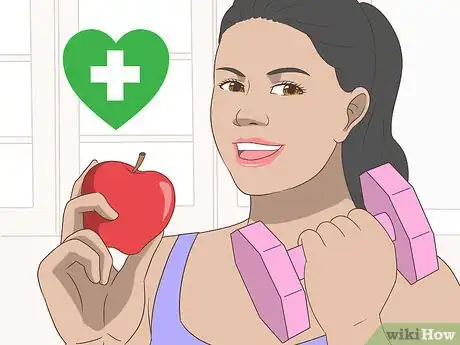

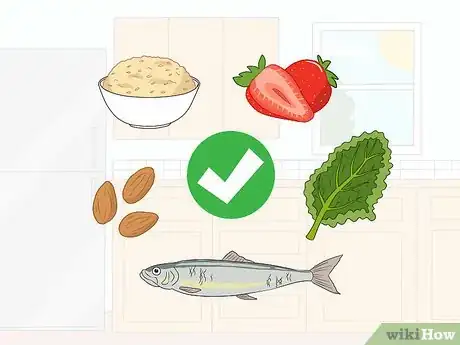
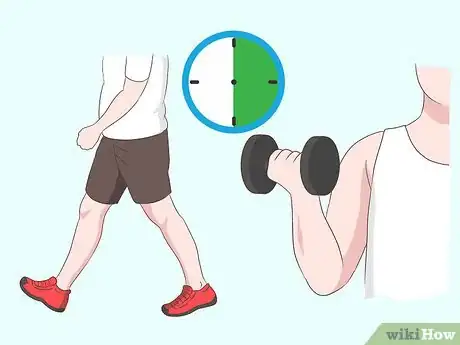
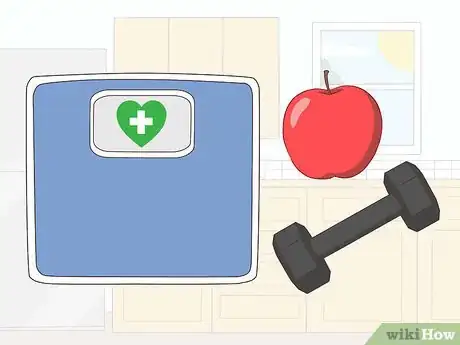
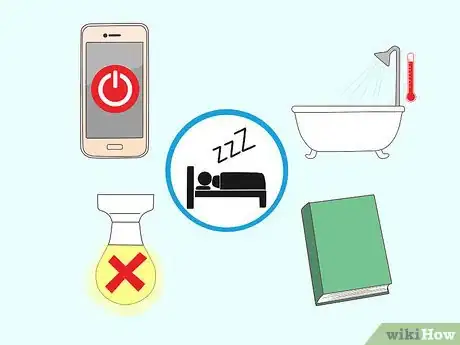

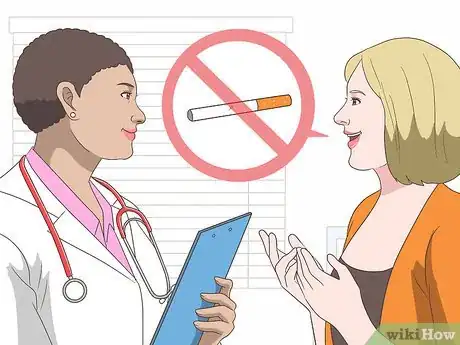
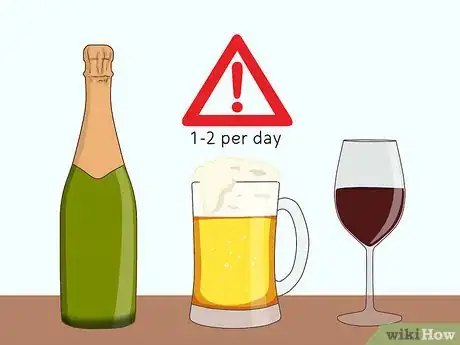
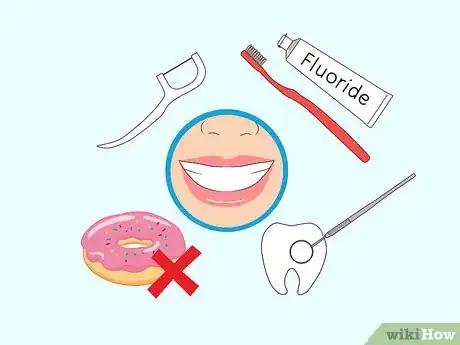
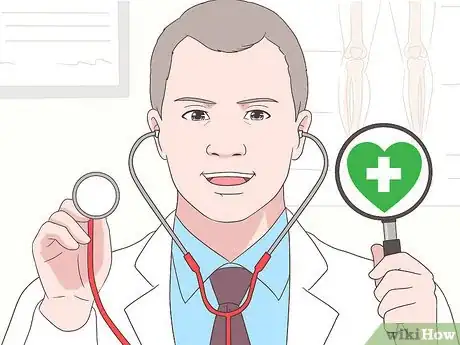






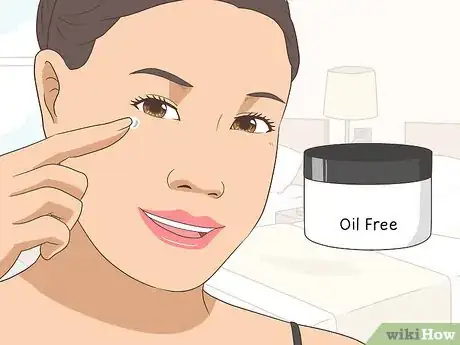
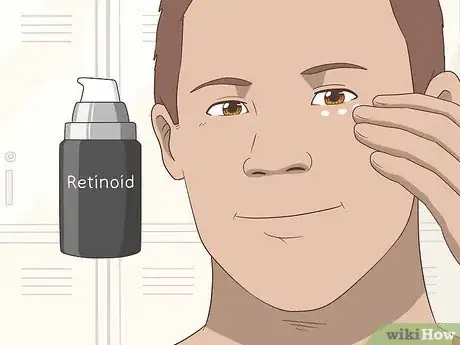
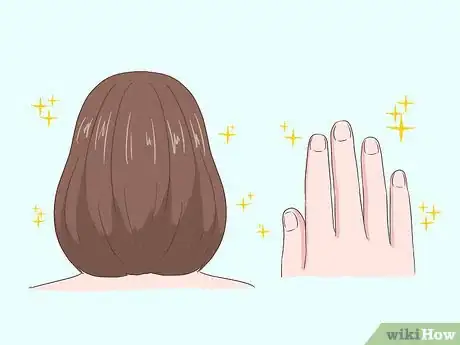
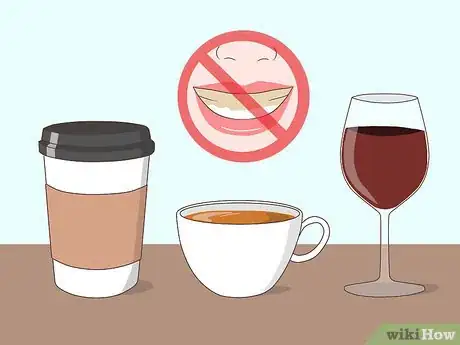
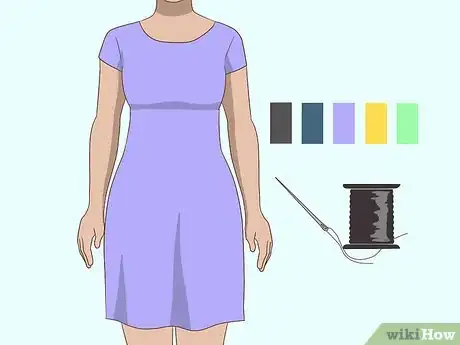













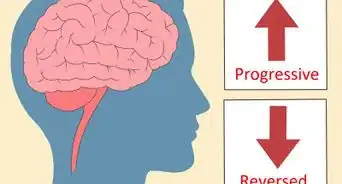















































Medical Disclaimer
The content of this article is not intended to be a substitute for professional medical advice, examination, diagnosis, or treatment. You should always contact your doctor or other qualified healthcare professional before starting, changing, or stopping any kind of health treatment.
Read More...